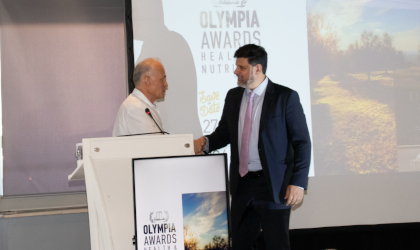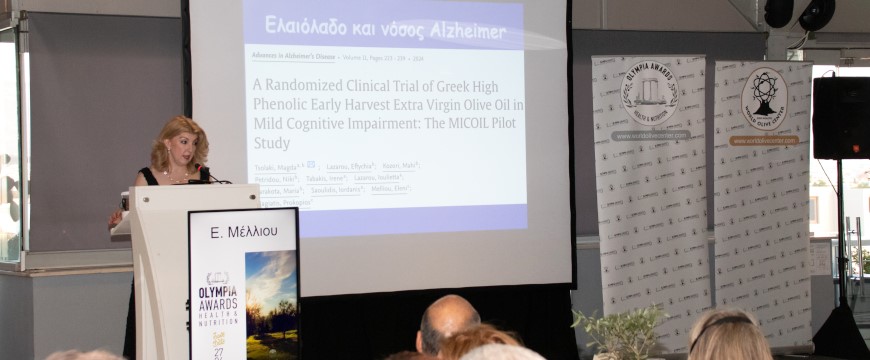Scientific research indicates that high phenolic extra virgin olive oil (HPEVOO) can play an important role in combatting many diseases. At the 2024 Olympia Health & Nutrition Awards ceremony organized by the World Olive Center for Health (WOCH) in Athens, scientists presented some of the latest results of research on HPEVOO that WOCH has supported.
There is no cure for multiple sclerosis (MS), a common neurodegenerative disease involving chronic inflammation of the central nervous system. Can the naturally-occurring phenolic compounds (polyphenols) found in early harvest olive oil have a protective effect on the brain that reduces the speed of symptom development in MS, as it seems to do in Alzheimer’s? This question was explored in a clinical study discussed in Maria Loizou’s PhD dissertation, as supervised and presented in Athens by Professor Georgios Spanoudis from the University of Cyprus.

At the AHEPA hospital in Thessaloniki, Greece, 24 MS patients were given 50 ml of high phenolic extra virgin olive oil daily after lunch, while a control group of 20 received no extra virgin olive oil. (Funding came from the Leventis Foundation and WOCH, with Eliama olive oil donated by Ellis Farm.) After 12 months of HPEVOO, preliminary results showed improved processing speed, cognitive flexibility, memory, and overall quality of life, with less dysphoria, sadness, and fatigue experienced by the patients that used high phenolic EVOO in addition to their usual treatment. This supported Spanoudis’s assertion that “polyphenols indeed have a neuroprotective effect.”
Focusing on a less known, yet fairly common and very serious disease, neurofibromatosis, type 1 (NF1), Dr. Pavlina Sverak from the University of Minnesota presented a study of a nutraceutical intervention with high phenolic extra virgin olive oil and curcumin. NF1’s symptoms include benign and malignant tumors, unsightly and painful or itchy skin conditions, headaches, and high blood pressure. NF1 can result in blindness and cancer of the nerve sheath or the breast.
Investigating therapies for NF1 as the parent of a young man with the disease, Sverak discovered a small clinical study in which a Mediterranean diet plus curcumin showed promising results. Given already-existing evidence that a diet rich in olive oil has anti-inflammatory and anti-cancer properties, Sverak’s son’s physician, Dr. Christopher Moertel, and a collaborator, Dr. David Largaespada, undertook preclinical investigations using NF1 mice. They found that curcumin combined with oleocanthal from olive oil caused NF1 tumors in mice to shrink.
The next step was a small (15-person) year-long clinical trial of curcumin with olive oil at the University of Minnesota. For this, Sverak received assistance from WOCH’s general secretary, Dr. Prokopios Magiatis, and Olive Fabrica (The Governor) and Sparta Spirit (Omfakion) donated high phenolic olive oil. In this FDA-approved study, promising preliminary results have included reports of reduced itching, headaches, and pain in several patients.
On a different front, Dr. Evangelos Dadiotis from the National and Kapodistrian University of Athens described a pioneering study that he expects to “bring about a revolution” in the cannabis and olive oil markets. Supported by the Leventis Foundation, Dadiotis and his team investigated what happens to cancer cells and epileptic action when they are attacked by a combination of olive oil phenols and the components of industrial hemp, polyphenolic compounds called non-psychotropic cannabinoids.
Dadiotis reported that his team’s studies in animals show that the olive oil phenols oleocanthal and oleacein can work together with cannabinoids (CBD) to fight against the TRPA1 channels that are overexpressed in melanoma, breast cancer, and liver cancer; this phenolic combination also demonstrated a powerful anti-epileptic effect. Clinical trials in patients are planned in order to confirm the exciting discovery that a combination of the components of olive oil and cannabis may help fight cancer and epilepsy.
Introducing another important investigation, Professor Georgios Samoutis from the University of Nicosia discussed the OleoMetS Study, the first clinical trial to investigate olive oil phenols’ effect on metabolic syndrome, a combination of conditions that can lead to heart disease, stroke, diabetes, and other problems. (The syndrome’s conditions include abdominal obesity, high blood pressure, high blood sugar, high triglycerides, and low levels of “good” cholesterol.)
This three-month double-blind study is comparing a placebo to Thousand Olives, the world’s first dietary supplement containing oleocanthal extracted from olive oil. This supplement contains 5 mg of four of olive oil’s most important phenols (the equivalent of phenolic compounds from 1000 olives, or 1.5 tablespoons of olive oil). Samoutis characterized this study as “an innovative effort to show if this blessed olive oil of our country can be turned into actual medication.” In addition to the University of Nicosia, the study brings together researchers from Yale, the University of Athens, and the University of Crete. Results of the study will be announced at a future Olympia Awards ceremony.
Many more scientific studies have been supported by the World Olive Center for Health, along with other donors, since WOCH was founded in 2018, as its president, Dr. Eleni Melliou, explained. These include an animal study of the anticancer properties of the phenolic components of olive oil and clinical studies of olive oil’s action against platelet aggregation in diabetes patients and against chronic lymphocytic leukemia, mild cognitive impairment (early Alzheimer’s), heart disease, autism, and osteoarthritis. In all of these cases, the results have suggested that high phenolic EVOO can help fight the diseases studied, as publications listed on WOCH’s website show.
Presenting a quick scientific review of other significant work on high phenolic extra virgin olive oil, Prokopios Magiatis pointed out that the National and Kapodistrian University of Athens, where he and Melliou work, has more publications on oleocanthal than any other institution in the world.
Note: One of WOCH’s new initiatives is the Hellenic Olive Network, which all Greek scientists who have published work on olive trees and/or their products are invited to join, in order to facilitate additional collaboration that can benefit human health, scientific advances, and the olive sector. Interested scientists can email This email address is being protected from spambots. You need JavaScript enabled to view it..
Greek Liquid Gold was a media sponsor of the Olympia Health & Nutrition Awards. Lisa Radinovsky does freelance writing and editing for the World Olive Center for Health, which covered her travel, lodging, and dinner expenses.
Thanks to the World Olive Center for Health for the photos that appear with the article.
All businesses, organizations, and competitions involved with Greek olive oil, the Mediterranean diet, and/or agrotourism or food tourism in Greece, as well as others interested in supporting Greeks working in these sectors, are invited to consider the advertising opportunities on the Greek Liquid Gold: Authentic Extra Virgin Olive Oil website. The only wide-ranging English-language site focused on news and information from the Greek olive oil world, it has helped companies reach consumers in more than 220 countries around the globe



